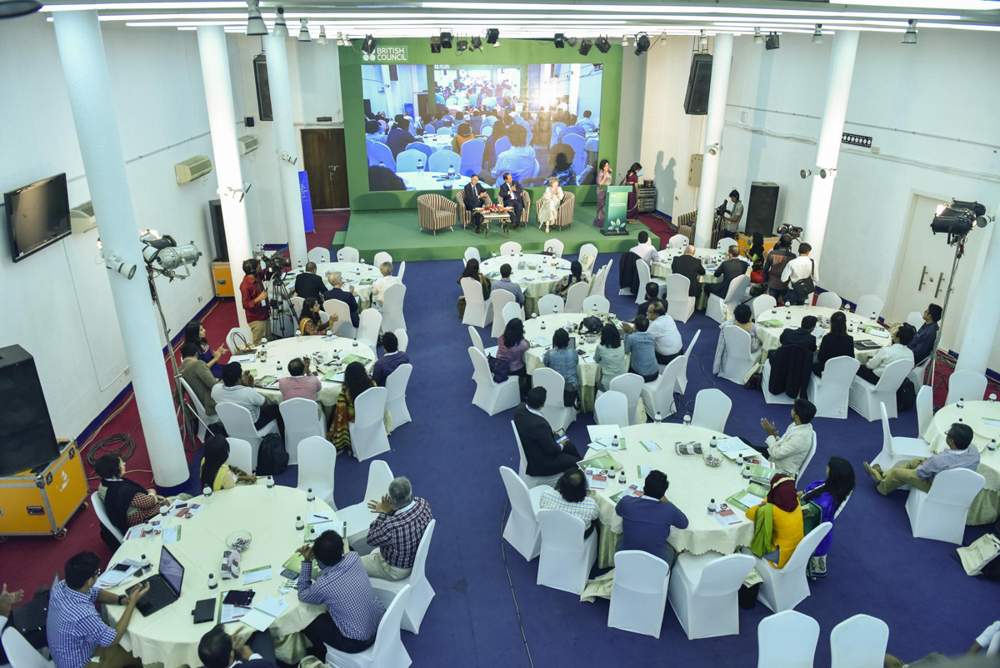
After two days of thought-provoking, mind-bending keynotes and panels and hyper-networking at the British Council’s policy dialogue event titled Social Enterprise: Impact and Opportunities, a few common themes have emerged.
I offer four of them here with a disclaimer: there will be few more specific takeaways, with specific focus in areas like health, agriculture, technology and policy, please stay with us. However, these are the prevailing ones in more general sense. [Future Startup was a Strategic partner of the event]
Entrepreneurs and panelists across board think that social enterprises have to come up with sustainable business model while also having greater impact. It has been found that having a sustainable business model helps social enterprises to have greater impact.
[su_divider top="no" text=" " divider_color="#e8e7e6" link_color="#edde29" size="1" margin="10"][/su_divider]
1. Impact Without Sustainability And Scale Does Not Make Sense Anymore
Most of the social entrepreneurs and experts attended the two days gala of talks and conversations believe that social enterprises should come out of the conventional approach of depending on funding and grants and should build more sustainable and scalable organizations.
Many of them argued it is futile to think about impact while you can’t not scale that impact and also sustain without spoon-feeding as an organization.
Entrepreneurs and panelists across board think that social enterprises have to come up with sustainable business model while also having greater impact. It has been found that having a sustainable business model helps social enterprises to have greater impact.
[su_divider top="no" text=" " divider_color="#e8e7e6" link_color="#edde29" size="1" margin="10"][/su_divider]

2. No Regulations Is No Better Than Bad Regulations. Social Enterprise Needs Legal And Policy Framework
It is hard for social enterprises, in today’s scenario, to have legal support and intellectual property rights since there is no specific framework for social enterprises. There are organizations, all kinds of it, calling themselves social enterprises, and the absence of a framework makes it difficult to deal with these organizations.
While it is holding back the growth of the sector, it is also making things hard for the individual social entrepreneurs who are authentically trying to make a difference. A conducive and flexible framework will help the sector grow and maximize the impact.
However, it is also very difficult for the policy makers and regulators to come up with separate policy and legal framework unless there is a clear conceptual framework of social enterprise.
A conducive and flexible framework will help the sector grow and maximize the impact.
[su_divider top="no" text=" " divider_color="#e8e7e6" link_color="#edde29" size="1" margin="10"][/su_divider]
3. To Survive and Flourish Social Enterprises Would Need To Transform
Most of the social enterprises are still doing the catching up when it comes to competing with the private businesses. However, that’s where social enterprises will have to be today or tomorrow, solving more pressing and critical issues for the larger group of the population. If a social enterprise is not competent enough and can’t deliver something better than what exists in the market, it will struggle.
[su_divider top="no" text=" " divider_color="#e8e7e6" link_color="#edde29" size="1" margin="10"][/su_divider]
4. Create Value, Make Money And Grow
There is a negative connotation around the idea that social enterprises making profit which should be okay. Social enterprises should build large businesses, make enough profit to scale their impact and grow big. However, making money should not be the intention and must not be achieved at the expense of impact and value.
[su_divider top="no" text=" " divider_color="#e8e7e6" link_color="#edde29" size="1" margin="10"][/su_divider]
5. Technology Is The Thing
Technology is no more an enabler, technology is the thing now. The challenge is how we can make these technologies available to more and more people or use technology to deliver better services to the larger group of the population.
Instead of playing the catching up game, which social enterprises often do, social enterprises need to be in the game and bring disruptive technologies to tackle social problems.
There is a negative connotation around the idea that social enterprises making profit, which should be okay. Social enterprises should build large businesses, make enough profit to scale their impact and grow big. However, making money should not be the intention and must not be achieved at the expense of impact and value.
[su_divider top="no" text=" " divider_color="#e8e7e6" link_color="#edde29" size="1" margin="10"][/su_divider]
6. Telling Stories Always Help
There is a general lack of awareness about social enterprise in Bangladesh. Then there is a huge misconception around the idea that social enterprises are essentially non-profits or small organizations or voluntary organizations or NGOs. These organizations can be social enterprises, may be, but these are not the only ones.
Social enterprises are tackling serious social problems globally in a more sustainable way with solid business models in place.
Experts and entrepreneurs argued, we need to tell more stories of social enterprises and entrepreneurs in order to create knowledge and awareness and right kind of motivation and at the same time, to inspire more people to start social enterprises.
This year’s Policy Dialogue on Social Enterprise, a two day long conference, titled ‘Social Enterprise: Impact and Opportunities’ is the second of its kind. The conference, a combination of keynotes, talks, panels, and mind-blowing conversations took place at the British Council, 5 Fuller Road, Dhaka. You may read more here and here.
